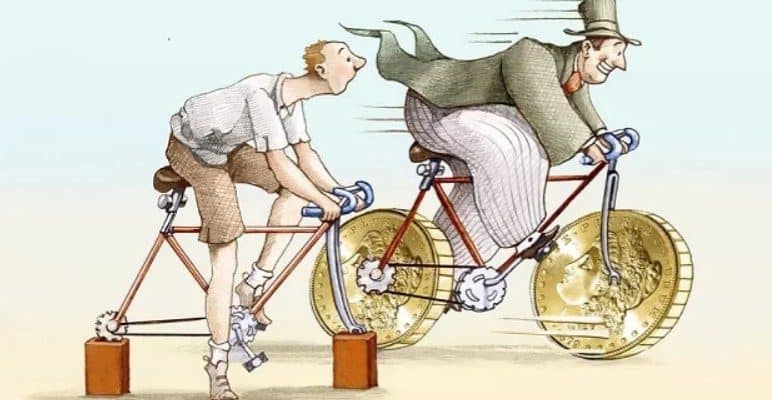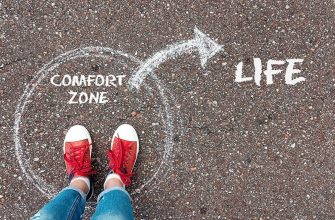The psychology of poverty and the thinking of a poor person, the complex of lack of money and poverty – why poor people attract poverty, and rich people attract money. Let’s try to answer this question. And most importantly, what to do about it if the beggar complex is haunting you? The article was created based on a series of posts from the OpexBot Telegram channel , supplemented by the opinion of the author and the opinion of the AI.
Have you ever wondered why the rich get richer, while the poor cannot escape the whirlpool of poverty?
One of the reasons was explained by Richard Thaler and he called it the “initial wealth effect.” If you liked long stories at school, check out the book “Fundamental Ideas of the Financial World.” Evolution”: Peter Bernstein. For those who like short retellings, I will state the essence. Richard Thaler conducted an experiment to test the lack of invariant thinking in finance. ✔ He invited a group of students to imagine that each of them won 30 USD. Then there are two options: toss a coin and, depending on whether it comes up heads or tails, get more or give 9.00. Or don’t flip the coin at all. 70% of the subjects decided to toss a coin. ✔ The next day Thaler proposed this situation to the students. Their initial capital is zero, and choose one of the following options: toss a coin and get $39 if it lands on heads, or $21 if it lands on tails. Or don’t give it up and you’re guaranteed to get $30. Only 43% of students agreed to risk throwing, the rest preferred a guaranteed win. The point is thatthe end result is the SAME. Whether you start with $30 or from zero, the probable winnings are each time contrasted with the guaranteed amount. Students, however, exhibit different preferences, thereby demonstrating a lack of invariance. Thaler called this discrepancy the “initial wealth effect.” If you have money in your pocket, you tend to take risks. If it is empty, then you would prefer to take 30 USD with a guarantee, rather than play at the risk of getting 21 USD. And this is not an abstraction. In the real world, this effect is of no small importance. And not only in the financial sector. For the poor, stable long-term poverty is closer than the “risk” of becoming rich, but also the possibility of losing a penny. There is a stronger desire to preserve rather than increase, albeit with some risks. This is against logic, but fears do not sleep. But not everything is so hopeless. Awareness of the problem is half of its solution. If you look soberly, then this is not even a problem, but a feature of thinking. It is from these artificial frameworks that we need to break out. Habits of the poor:
- By the way, an experiment: the basics of understanding poverty and wealth were explained by a metronome
- What does an omniscient AI think about the thinking of a poor and a rich person?
- And another study about poverty, wealth and the difference between them: money eliminates pain not figuratively, but in reality
- What to do with this fact?
By the way, an experiment: the basics of understanding poverty and wealth were explained by a metronome
Poverty is contagious, so is wealth. An experiment was conducted. Metronomes were installed on a moving platform, which initially moved at random. Gradually they synchronized in their movement. This works with any number of metronomes. Whichever direction the majority swung, the platform and everyone else will go there. It’s the same with people. The environment makes the person. You need to get into the right company to synchronize with wonderful successful people and constantly develop! https://youtu.be/tJaTxfRPvGI Drive away demotivated, toxic, unprincipled and simply lazy people who can swing the platform in the wrong direction.
What does an omniscient AI think about the thinking of a poor and a rich person?
Below is a compilation of artificial intelligence opinions on the following questions: thinking of a beggar, thinking of a rich person, poor person’s complex, beggarly thinking. The text has been modified according to opexflow resource standards without distorting the AI’s opinion. In modern society, the concept of poverty is associated primarily with a lack of material opportunities. However, there is another, no less important side to this problem – the psychology that accompanies people in poverty. Poverty has a strong impact on the psychological state of an individual, his behavior and thinking. Feelings of powerlessness, low self-esteem and hopelessness are an integral part of the lives of those facing financial difficulties. One of the key elements of the psychology of poverty is constant stress. Financial problems can cause constant stress and anxiety, which in turn negatively affects a person’s physical and emotional health. Such psychological discomfort can lead to the development of various mental disorders such as depression, anxiety and sleep disorders. In addition, poverty can cause negative effects on cognitive processes and rational decision making. Constantly understating your money status can lead to a limited vision of the future and long-term plans, as well as a weakening of motivation and prospects. It is also worth noting that the psychology of poverty can lead to the formation of negative social images. Closedness misanthropy and aggressiveness sometimes become consequences of living in a constantly dysfunctional environment. People suffering from poverty may experience feelings of resentment and injustice, which can result in protest and social conflict. However, we should not forget that the psychology of poverty is not an inevitable phenomenon, and many people find the strength to get out of this situation. It is important to provide support, both financial and psychological, to help those who are experiencing difficulties. Considering the psychology of poverty is important for creating programs and supports that will help people cope not only financially, but also emotionally. It is necessary not only to provide material resources, but also to help restore self-esteem and faith in one’s capabilities. Thus, The psychology of poverty is a complex and multifaceted issue that requires attention and analysis. It shows that beyond the financial aspects, poverty has a huge impact on a person’s mental state and behavior. Recognizing this fact and taking steps to provide support will be a step towards a just and humane society. An interesting sign about the difference between the thinking and actions of poor and rich people:
One of the key elements of the psychology of poverty is constant stress. Financial problems can cause constant stress and anxiety, which in turn negatively affects a person’s physical and emotional health. Such psychological discomfort can lead to the development of various mental disorders such as depression, anxiety and sleep disorders. In addition, poverty can cause negative effects on cognitive processes and rational decision making. Constantly understating your money status can lead to a limited vision of the future and long-term plans, as well as a weakening of motivation and prospects. It is also worth noting that the psychology of poverty can lead to the formation of negative social images. Closedness misanthropy and aggressiveness sometimes become consequences of living in a constantly dysfunctional environment. People suffering from poverty may experience feelings of resentment and injustice, which can result in protest and social conflict. However, we should not forget that the psychology of poverty is not an inevitable phenomenon, and many people find the strength to get out of this situation. It is important to provide support, both financial and psychological, to help those who are experiencing difficulties. Considering the psychology of poverty is important for creating programs and supports that will help people cope not only financially, but also emotionally. It is necessary not only to provide material resources, but also to help restore self-esteem and faith in one’s capabilities. Thus, The psychology of poverty is a complex and multifaceted issue that requires attention and analysis. It shows that beyond the financial aspects, poverty has a huge impact on a person’s mental state and behavior. Recognizing this fact and taking steps to provide support will be a step towards a just and humane society. An interesting sign about the difference between the thinking and actions of poor and rich people:
And another study about poverty, wealth and the difference between them: money eliminates pain not figuratively, but in reality
Poverty is pain – real, burning and unbearable. This information is provided by a study in which 1.3 million people from 146 countries took part. Participants were asked about their monthly income and then whether they experienced PHYSICAL pain yesterday. People with lower incomes experienced pain much more often. Sociologists have concluded that physical pain causes cognitive dissonance between the respondent’s standard of living and a beautiful picture of the outside world. Stress, irritation, depression, panic attacks, as a result. The second reason is that it is emotionally unbearable for a person, if he is not confident in the future, to satisfy basic needs, goal number one. Under extreme stress, the brain cannot stand it and some of the psychological pain is “distilled” into physical pain.
What to do with this fact?
My opinion is clear: to eliminate pain, you need to treat its cause. Reach a level of life where your emotional state is stable. Or get used to the fact of vegetation and abandon higher goals. But this is about relieving symptoms. And this is an ineffective and temporary measure. Defeatist even.




